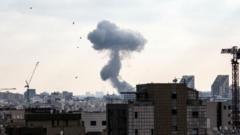Public outcry emerges in cities nationwide as citizens rally against escalating military involvement in Iran amid concerns over leadership and regional stability.
**Protests Erupt Across the U.S. Against Military Action in Iran**

**Protests Erupt Across the U.S. Against Military Action in Iran**
Demonstrators Rally to Express Opposition to the Trump Administration's Airstrikes
June 22, 2025, saw spontaneous protests erupting in several U.S. cities against the recent airstrikes launched by the Trump administration in Iran. Demonstrations unfolded in cities including New York, Washington D.C., Boston, and Los Angeles, and while some gatherings attracted hundreds, others garnered only small crowds, showing a significant decrease in participation compared to previous recent protests championing broader national issues.
Protesters gathered carrying Iranian flags and displayed signs and banners declaring “No War in Iran!” While many voiced their dissatisfaction with the Iranian government, the unifying sentiment was a strong objection to further U.S. military engagement. Outside the White House in D.C., a group of about two hundred, including veterans, rallied against what one speaker, Ron Carmichael, described as the president's attempts at authoritarianism.
In Chicago, similar sentiments were expressed. Ali Tarokh, an Iranian émigré who suffered imprisonment for political dissent, labeled the airstrikes as disastrous, advocating for gradual reform over reckless regime change. Protesters across various cities echoed the belief that military action would exacerbate conflict and sufferings, particularly concerning the Palestinian situation in Gaza.
Los Angeles witnessed a peaceful assembly led by Noor Abdel-Haq, who articulated her familial ties to the turbulent Middle East, stating, "We don’t want more murder and destruction." In other areas, gatherings remained small yet impactful, such as a collective in Richmond, Virginia, where local activist Violeta Vega emphasized a message prioritizing education and jobs over military expenditure.
As the day concluded, national unity against unwarranted warfare rang clear even in the sparse attendance, marking an essential moment of grassroots resistance amid a growing tide of discontent with governmental foreign policies.
Protesters gathered carrying Iranian flags and displayed signs and banners declaring “No War in Iran!” While many voiced their dissatisfaction with the Iranian government, the unifying sentiment was a strong objection to further U.S. military engagement. Outside the White House in D.C., a group of about two hundred, including veterans, rallied against what one speaker, Ron Carmichael, described as the president's attempts at authoritarianism.
In Chicago, similar sentiments were expressed. Ali Tarokh, an Iranian émigré who suffered imprisonment for political dissent, labeled the airstrikes as disastrous, advocating for gradual reform over reckless regime change. Protesters across various cities echoed the belief that military action would exacerbate conflict and sufferings, particularly concerning the Palestinian situation in Gaza.
Los Angeles witnessed a peaceful assembly led by Noor Abdel-Haq, who articulated her familial ties to the turbulent Middle East, stating, "We don’t want more murder and destruction." In other areas, gatherings remained small yet impactful, such as a collective in Richmond, Virginia, where local activist Violeta Vega emphasized a message prioritizing education and jobs over military expenditure.
As the day concluded, national unity against unwarranted warfare rang clear even in the sparse attendance, marking an essential moment of grassroots resistance amid a growing tide of discontent with governmental foreign policies.





















